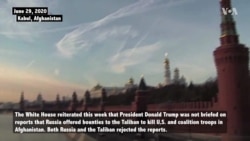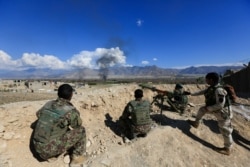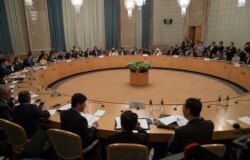Amid controversy in Washington over reports that a Russian intelligence unit paid bounties to Taliban militants to kill U.S. and NATO soldiers in Afghanistan, some Afghan lawmakers say it is no secret Russia has cultivated close contacts with the Taliban and it is likely Russia has financially supported Taliban violence.
Shinkai Karokhail, a member of the Wolesi Jirga, the lower house of Afghanistan’s parliament, told VOA, "It is thought that Russia has been supporting the Taliban, and it has provided the Taliban with the means so that the war, the U.S. engagement, in Afghanistan continues.”
Karokhail said media reports about the Russian bounties needed to be investigated. She added, however, it is plausible that the Taliban receive financial support from other countries in the region.
“To continue fighting, the Taliban need money, and for sure, countries such as Russia, Pakistan, Iran and others would be providing them money,” she said.
Gulalai Sapi, an Afghan senator, said Russia and some other regional powers do not see their interests in the peace process in Afghanistan.
“Some countries may not want this process to be implemented as soon as possible because war in Afghanistan is in their interest,” she said.
Last week, The New York Times, citing anonymous U.S. intelligence sources, reported that a Russian intelligence unit offered bounties to the Taliban for killing American and coalition soldiers in Afghanistan. The newspaper said U.S. President Donald Trump was briefed on the issue.
Senior U.S. intelligence officials briefed a bipartisan group of U.S. lawmakers Thursday after members of Congress called for additional information on the issue.
Russia and the Taliban have rejected the allegations, and the Afghan government has declined to comment despite several requests to the country’s presidential office and the national security council.
Russia-Taliban relations
Sim Tack, a military analyst with the Stratfor global intelligence firm, told VOA he was not surprised that Russian intelligence would be “trying to encourage them [the Taliban] to target coalition forces in any way.”
Tack said Russia’s interest is in building relations with the Taliban “as a way to ensure Russian influence in a post-U.S. Afghanistan.”
He added that “if Russia is able to build a cooperative relationship with the Taliban at this point, then that definitely will help them carry a greater role in Afghanistan in the future.”
Moscow has been in contact with the Taliban since 2015, and as part of Moscow efforts toward a political settlement in Afghanistan, it hosted a number of intra-Afghan meetings in 2019.
Jonathan Schroden, director of the Center for Stability and Development at Washington-based research and analysis organization CNA, said uncertainty about the future of Afghanistan convinced regional countries, including Russia, to build relations with the Taliban.
Schroden added that Russia and other countries in the region were considering having contacts with the Taliban “in the event that the Taliban end up winning.”
He further said these countries engage not only with the Taliban’s leadership but also with the rank and file of the militant group, and “[it] probably includes some amount of support to the Taliban organization, whether that is money, guns or training.”
Senior U.S. military officials in the past did not discount the notion of Russia's having ties with the Taliban.
General Joseph Votel, the then-commander of U.S. Central Command, told members of the House Armed Services Committee in March 2017 that “it is fair to assume they [Russians] may be providing some sort of support to [the Taliban], in terms of weapons or other things that may be there.”
Justifications
Atiqullah Amarkhil, a retired Afghan army general, said the Russians might be thinking of revenge for the role the U.S. had in the Soviet defeat in Afghanistan in the 1980s.
“When Russians were in Afghanistan, the Americans were paying mujahedeen to fight against Russians, so it is possible that Russians, because of that, have developed relations with some Taliban groups, or a Taliban commander, so that they continue fighting.”
Najeeb Nangyal, an Afghan political analyst, told VOA that Russia justifies its support to the Taliban as part of its strategy to counter the Islamic State in the region.
Daniel Davis, a retired U.S. Army lieutenant colonel who is now a senior fellow and military expert at the Washington-based think tank Defense Priorities, said that if Russia provides support to the Taliban to counter the Islamic State, the support can be used against the coalition forces.
“If Russians are helping the Taliban counter ISIS operation, well, obviously that help can also be used for any type of operations,” Davis said.
Gul Rahman Hamdard, a member of the Wolesi Jirga, said Russia has an interest in the war in Afghanistan.
“It should be clear now to Afghans that major countries benefit [from the war in Afghanistan],” Hamdard added. “This opportunity [the peace process] should be seized and Afghans should know that this is foreigners’ war.”
Russia and the peace process
Russian Ambassador to the U.S. Anatoly Antonov told journalists Tuesday that Russia was working with the United States on Afghanistan. According to Russia’s Tass news agency, Antonov said the countries were joining efforts “towards political settlement in Afghanistan.”
The Department of Defense, in a report published in early June, said that “Russia very likely continues to support U.S.-Taliban reconciliation efforts in the hope that reconciliation will prevent a long-term U.S. military presence.”
Schroden said Russia wants the U.S. to leave Afghanistan. He added that “they do not want the U.S. peace process to be the vehicle by which the U.S. leaves.”
"The ideal outcome for Russia,” said Schroden, would be to revive the Moscow Process for peace. “The Moscow Process leads to a peace settlement between the Taliban and the Afghan government and then the U.S. leaves.”
The U.S. military officials, however, called the Russia-led peace process in Afghanistan an attempt to undermine NATO.
Valeria Jegisman from Washington contributed to this report.








